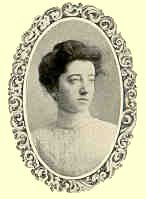 |
|

Dear Class-mates:
Perhaps some of you recall the characteristic way Dr. Thomas said: 'There are two objections to a college education for women. One _ they marry. The other _ they do not marry!' (This paradox was understandable in those distant days_ but to think that our life-span reaches back so far to a time when it was understandable!) If the deeds and the spirit represented by these letters I have just read could have been foreseen then, both sets of carpers would have been promptly silenced.
By the way, I was present at Alumna Lodge when due tribute was paid to Dr. Thomas in a Quaker-like gathering that calmly expressed the triumph of a life of service rather than the sadness usually associated with the word 'funeral'.
First of all for the spirit and for the deeds of '03_CONGRATULATIONS!
Possibly I say this the more heartily because my own life-history has recently been rather like Mary Taylor Reynold's temporary experience in New York. In other words my belief that adjustment is the secret of true living (its highest form, Eternal Living) is being well tested. I have retired from teaching and am managing on a tiny income. Hence, 'Do ye nexte thynge' may mean anything from dish-washing at home to historical research in our new ideal Pratt Library (my most recent, delightful 'job'.) During the last three summers I have continued contacts with young girls in a Home near New York City; but in the fall return to Baltimore and to an elderly relative _ another gracious lady of eighty-six to add to the list, alert and cheerily spending at times as much as eight hours a day sewing and knitting for the Woman's Auxiliary and the Red Cross.
You teachers know so well that the sweetest fruits of our work are the life-long bonds of motherly interest, often evolving into god- mother or grandmotherly interests for the next generation. Such responsibilities and joys have led me twice to California and once to Wisconsin. One child-of-my-heart who has not escaped the snares and quicksands has taught me more psychology than any text book. The other special one has had a career of rare happiness and even brilliancy. I rejoice that I seem destined to have intimate contacts with extremes of age and also of experience, having taught the under-privileged in isolated mountain districts for nine years and the opposite type for nineteen years, finding of course the same fundamental traits under the surface home-spun or silk! Two years and parts of five summers I have spent in study.
Since my mind seems to be working in contrasts, one more claims a word, a commonplace to many very likely: as we go deeper into life, we learn to think less of 'private plans and much of God's general providences', as Cannon Liddon puts it in my recent research work responsible for exact words. And at the same time we become increasingly aware of the tiny providences of daily life, those particles making up the whole of one's life plan. And so everything IS worth while in a different way from what it seemed back in the good old days of 1903.
With best wishes for each one, around, beyond, and above the richly deserved congratulations,
Very sincerely,
Letitia Ricaud
P.S. On account of vacation, this has waited until Clara returned to town.
I wonder how many of those still interested in child psychology in a practical way have seen the book of Bertha Stevens on The Child and the Universe (idea, if not exact title).
L.R.
 |
|
Last Updated 8/30/99.